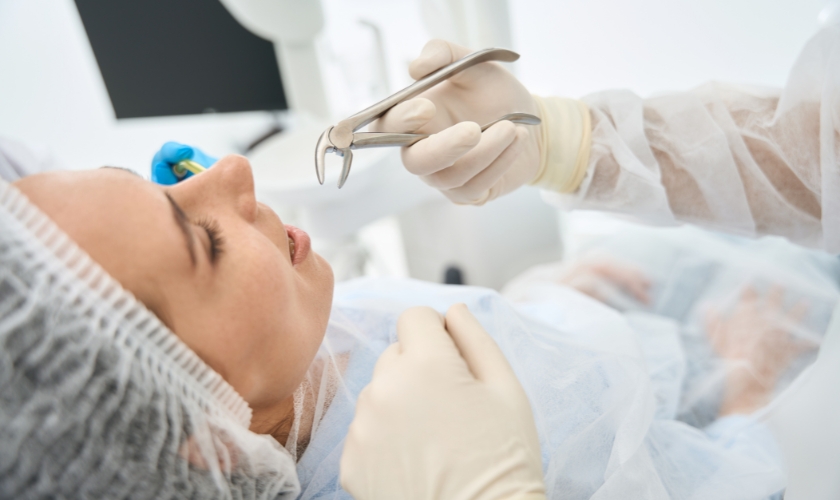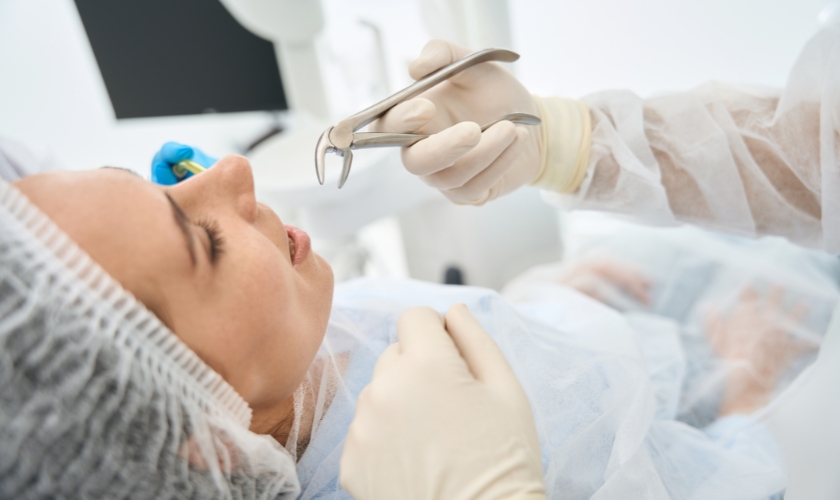Book An Appointment

Sometimes, having a tooth removed can feel intimidating. Proper care lets your mouth heal smoothly and comfortably after tooth removal. Tooth extraction is often the last resort to relieve pain, prevent infection, or make room for healthier dental work. What happens after the procedure is an essential part of the recovery process.
Let us explore how to care for your mouth after a dental extraction in Tar Heel, what to expect during recovery, and how to spot signs that you are healing well.
What Happens Right After A Tooth Removal?
After the tooth removal procedure, a blood clot forms in the empty socket. This clot protects the bone and nerves underneath while the area heals. Your dentist will place gauze over the site and may ask you to bite down to help stop bleeding. It is important not to disturb the clot because it plays a key role in the healing process.
Dental Extraction Recovery Steps
Recovering from exodontia takes time and care to ensure your mouth heals properly. Some discomfort is normal during the first few days. Your dentist may suggest pain relief medicine or over-the-counter options.
If you are recovering from or looking for a tooth extraction in Charlotte, NC, you can follow these steps to reduce pain, prevent infection, and speed up recovery:
1. Rest and Take It Easy
Gentle rest helps control bleeding and supports faster healing. Avoid physical activity for at least 24 hours after the procedure. Keep your head slightly raised when lying down to reduce swelling.
2. Manage The Pain
Applying a cold compress to your cheek for 10 minutes at a time can help reduce swelling and ease soreness. Avoid applying heat, as it can increase inflammation.
3. Watch Your Diet
Stick to soft foods for the first few days; soups, yogurt, mashed potatoes, or scrambled eggs are good options. Avoid crunchy, spicy, or sticky foods that irritate the extraction site. Avoid using a straw, as the suction can loosen the clot and cause a painful condition called dry socket.
4. Gently Clean The Area
Good oral hygiene helps prevent infection. After 24 hours of surgery, rinse your mouth with warm salt water multiple times a day to keep the area clean. Do not brush or floss directly over the extraction site until your dentist says it is safe.
5. Avoid Smoking or Alcohol
Try to avoid smoking for at least three days and skip alcohol until your dentist confirms you are healing correctly. Both can delay healing and increase the risk of infection.
6. Schedule A Follow-Up
If you notice anything unusual, contact your dentist right away. Even if you feel fine, a follow-up visit helps ensure everything is healing as expected.
Signs You May Need Further Care: What to Watch For?
While healing from a tooth extraction is usually straightforward, you must be aware of any signs indicating a problem. Here is what you should look for:
- Excessive Pain:
Some discomfort is normal in the first few days, but if you experience severe pain after a few days, it could be a sign of dry socket or infection. - Persistent Bleeding:
If bleeding does not stop after the first few hours or if you continue to experience significant bleeding, contact your dentist immediately. - Signs of Infection:
Swelling, redness, or pus around the extraction site may indicate an infection. If you notice any of these signs, it is important to contact your dentist as soon as possible for proper treatment.
Take the Right Steps Toward a Comfortable Recovery
A dental extraction does not have to be stressful. Mild swelling and tenderness are common in the first day or two. By day 3, discomfort should begin to fade. After a week, the gum tissue starts closing over the socket. Complete recovery can take up to 2 weeks, depending on the size of the tooth and your overall health.
If you need proper guidance on tooth extraction in Charlotte, NC, contact Dentistry of Uptown Charlotte and schedule a consultation. With a little care and patience, your mouth will heal well and feel better quickly.
FAQs
1. How long does it take to heal after a dental extraction?
Most people heal within one to two weeks after a tooth extraction. Larger extractions or surgical removals may take a bit longer.
2. Is pain normal after a dental extraction?
Mild pain or soreness is normal for a few days after a tooth is removed. If the pain worsens after 3 days, it could be a sign of dry socket or infection.
3. How can I speed up the healing process of oral surgery?
Follow your dentist’s aftercare instructions, rest, and eat soft foods. Keep the area clean while not disturbing the clot.
4. Can I brush my teeth after a dental exodontia?
Yes, you can gently brush after surgical tooth removal. However, avoid brushing the extraction site for a few days. Use a soft-bristled toothbrush and rinse gently with warm salt water.
5. When can I go back to normal eating?
You can return to your regular diet once the site feels comfortable, usually after a few days. Start slowly and listen to your body.
6. Should I worry if I see a white layer on the wound?
No. A white or yellowish layer is part of normal healing tissue, not pus. If you notice foul odor or persistent swelling, contact your dentist or surgeon.
7. How do I find safe care for tooth extraction near me?
Look for a licensed dental clinic with qualified professionals who focus on comfort, clear instructions, and post-care support. If you are a Charlottean, Dentistry of Uptown Charlotte can be your go-to destination for adequate care.





